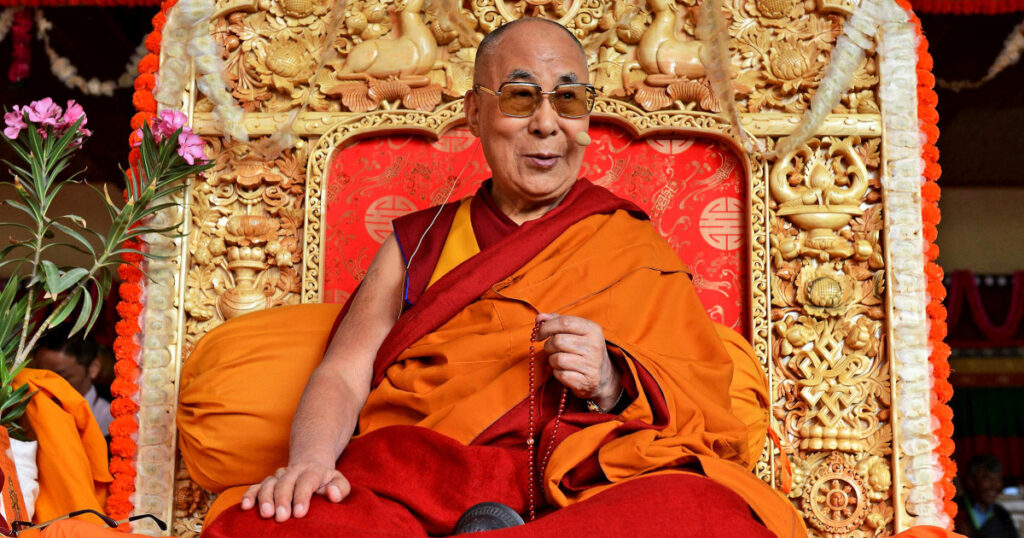The Dalai Lama announced on Wednesday that the Tibetan Buddhist institution he leads will continue after his passing, dispelling rumors that he might be the last to hold the title. In a statement made during celebrations for his 90th birthday, the Nobel Peace laureate emphasized that China should not interfere in the selection of his successor, a process deeply rooted in Tibetan tradition.
The Dalai Lama’s comments come as concerns grow about the future leadership of Tibetan Buddhism. He stated, “I am affirming that the institution of the Dalai Lama will continue,” and reiterated that the Gaden Phodrang Trust, an organization he established, holds the sole authority to recognize his future reincarnation. “No one else has any such authority to interfere in this matter,” he added.
The Context of the Dalai Lama’s Declaration
The announcement was made in Dharamsala, India, where the Tibetan government-in-exile resides. It is unusual for a living Dalai Lama to discuss his successor, as the search traditionally begins only after his death, involving a process of reincarnation. However, as the 14th Dalai Lama ages, there is increasing anxiety that a leadership void could be exploited by the Chinese government.
Thupten Jinpa, the Dalai Lama’s English translator for four decades, explained in a phone interview, “I think His Holiness feels the need to reassure people by basically letting them know that he is thinking about the succession.”
Historical Background and Political Implications
The 14th Dalai Lama was identified as a child in 1937 and formally recognized two years later. He became the spiritual and temporal leader of Tibet in 1950, coinciding with China’s annexation of the region. Following a failed uprising in 1959, he fled to India, where he has lived in exile since. Over the years, the Tibetan movement has shifted from seeking independence to advocating for genuine autonomy within China.
In March, the Dalai Lama suggested in a book that his successor would be born outside China, ensuring the continuation of the Dalai Lama’s traditional mission. This stance aligns with the Central Tibetan Administration’s position, which represents around 130,000 Tibetan exiles globally, primarily in India and Nepal.
China’s Position and International Concerns
China maintains that Tibet has prospered under its governance, citing improvements in infrastructure and economic development. However, it views the Dalai Lama as a political exile engaged in separatist activities. Beijing insists that the reincarnation of Tibetan lamas should be controlled by the Chinese government, adhering to Chinese laws and procedures.
“Reincarnation must comply with Chinese laws and regulations,” stated Mao Ning, a foreign ministry spokesperson, in March.
There is widespread concern that if Tibetans do not appoint a new Dalai Lama, China might select one unopposed, similar to the situation with the Panchen Lama. In 1995, the Dalai Lama recognized a young boy as the 11th Panchen Lama, but the child was subsequently disappeared by Chinese authorities. Beijing then appointed its own Panchen Lama, who has pledged loyalty to the Chinese Communist Party.
Expert Opinions and Future Prospects
Experts like Jinpa believe that while Tibetans would be disappointed if Beijing attempted to appoint a Dalai Lama, they would not be surprised. The Dalai Lama’s name has become synonymous with the Tibetan nation, and his leadership is seen as vital to preserving Tibetan identity and culture.
As the Dalai Lama approaches his 90th birthday, his statements are a clear message to both his followers and the international community about the importance of maintaining Tibetan traditions free from external influence.
The future of Tibetan Buddhism and its leadership remains a critical issue, with potential geopolitical implications. The international community will likely continue to monitor developments closely, as the Dalai Lama’s succession process unfolds in the coming years.
